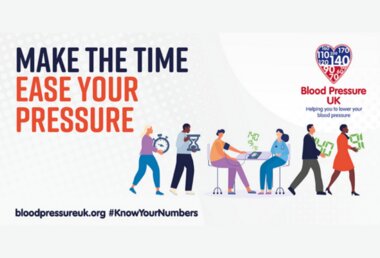6 September 2023
Know Your Numbers! Week is the UK's biggest blood pressure testing and awareness event.
If our blood pressure is too high – known as hypertension - it puts extra strain on our blood vessels, heart, and other organs, such as the brain, kidneys, and eyes. Persistent high blood pressure can increase our risk of a number of serious and potentially life-threatening health conditions like:
- heart disease
- heart attacks
- strokes
- heart failure
- peripheral arterial disease
- aortic aneurysms
- kidney disease
- vascular dementia
High blood pressure is a major cause of these diseases but usually has no symptoms until it’s too late, which is why it’s known as ‘the silent killer’. We could be at more risk of high blood pressure if we:
- are overweight;
- eat too much salt and do not eat enough fruit and vegetables;
- do not do enough exercise;
- drink too much alcohol or coffee (or other caffeine-based drinks);
- Smoke;
- have a lot of stress;
- are over 65 years old;
- have a relative with high blood pressure;
- are of Black African or Black Caribbean descent;
- live in a deprived area.
The good news is there are a number of lifestyle changes can help prevent and lower high blood pressure:
- reduce the amount of salt we eat and have a generally healthy diet
- cut back on alcohol
- lose weight if we are overweight
- exercise regularly
- cut down on caffeine
- stop smoking
Some people with high blood pressure may also need to take 1 or more medicines to stop their blood pressure getting too high.
High blood pressure is one of the Vital 5 – a King’s Health Partners created initiative which advocates for people, communities and organisations to make improvements in/to five factors that have a major impact on health at an individual and population level. Last year we profiled the team from Clinical Effectiveness South East London (CESEL) about how they are using data to monitor Type 2 diabetes and hypertension, and their work supporting GP surgeries in south east London.
https://
The theme for 2023’s Know Your Numbers! campaign is: ‘Make the time, ease your pressure’ – with a focus on home monitoring as it’s the easiest way to Know Your Numbers, so you can take steps to lower them. The campaign is encouraging people to measure their blood pressure at home.
Blood pressure is recorded with two numbers. The systolic pressure (upper number) is the force at which your heart pumps blood around our body. The diastolic pressure (lower number) is the resistance to blood flow in the blood vessels between heartbeats when blood is pumped around our body.
Dr Rachna Chowla, Joint Director of Clinical Strategy at King’s Health Partners, said:
As a GP I have a single patient who I will always remember. He was from a black minority ethnic group and young, and he presented with a bleed on his brain, collapsing in the surgery. This is how we realised he had had high blood pressure all along. Thankfully he is fine now, as is his blood pressure and I hope that more people knowing their numbers will make this sort of potentially catastrophic event, a thing of the past.
It’s never too early or late to start checking our blood pressure, and home monitoring is an effective and inexpensive way of finding out your numbers. High blood pressure is not an inevitable part of growing old - we can take steps to know our numbers and lower it if it’s high no matter our age.
Find out more about Know Your Numbers week at the Blood Pressure UK website.





